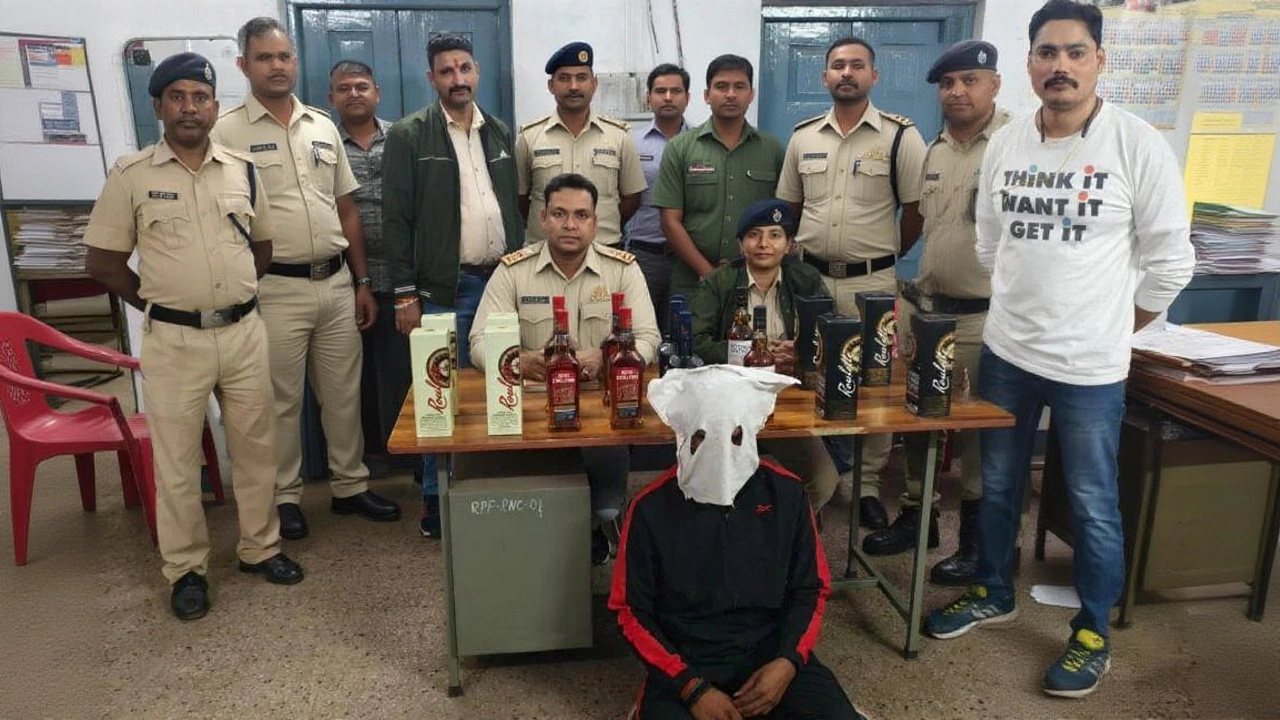When RPF rolled out a series of high‑profile operations across Bihar and Jharkhand this summer, locals found themselves suddenly staring at uniformed officers in places they’d never imagined seeing them before.
From a daring teenage rescue at a remote station in Jharkhand to a bottle‑full liquor bust on a crowded express train, the force’s actions have been as varied as they are conspicuous. Even a ceremony in Gaya honoring an inspector hinted at a morale boost inside the ranks. Here’s a rundown of what happened, why it matters, and what might be coming next.
Background: The Railway Protection Force’s Mandate
The Railway Protection Force was created in 2004 under the Railway Protection Force Act to safeguard passengers, railway property and ensure law and order on the nation’s vast rail network. Over the past two decades the force has grown to roughly 180,000 personnel, operating under the Ministry of Railways. Their duties range from crowd control at busy stations to investigating crimes that occur in moving trains.
What sets the RPF apart from regular police is its exclusive focus on the railway ecosystem – a world that moves millions daily, often under the radar of ordinary law enforcement. The force’s latest string of operations illustrates that focus in sharp relief.
Recent Field Operations
Rescue at Bakudi Railway Station
On July 3, 2024, officers from the Operation Nanha Farishta arrived at Bakudi railway station in Jharkhand after a frantic call from a station master. Two minors – a 14‑year‑old girl and a 17‑year‑old boy – had fled home following a heated family dispute and were hiding among the freight wagons.
“We found them shivering on a bench, terrified,” recalled Sub‑Inspector Arvind Kumar, who led the team. “Their story was heartbreaking, but the priority was getting them safe and back to the authorities.” The RPF escorted the youths to the local police station, where child welfare officials took over. The operation, which lasted less than two hours, prevented a potential tragedy and underscored the force’s role beyond traditional security duties.
Liquor Seizure on Saharsa Express
Just a week later, on July 10, 2024, a routine security sweep aboard the Amrit Bharat Saharsa Express at Bagaha station in West Champaran, Bihar, turned into a significant bust.
RPF teams uncovered 46 bottles of English liquor hidden in the general coach, with a total retail value of roughly ₹28,240. The contraband had been smuggled in by a group of travelers hoping to evade customs duties. “Such seizures send a clear message that illegal trade on our trains won’t be tolerated,” said senior RPF officer Meena Patel.
The seized liquor was handed over to the railway’s commercial department, and the passengers involved faced immediate detention and fine under the Indian Penal Code.
Women‑Safety Drive in Jhansi
Mid‑June 2024 saw the launch of the Meri Saheli team in Jhansi, Uttar Pradesh, just ahead of the festive season. The initiative aims to assist female travelers, collect feedback on safety concerns, and promote the railway helpline number 139.
“We’re out there from early morning till late night, checking platforms, helping with luggage, and listening to women’s stories,” explained team lead Kavita Sharma. Within the first ten days, the team recorded 127 complaints, ranging from harassment to inadequate lighting. The RPF promised to act on each case, and three suspects were already earmarked for investigation.
Honors for an Inspector in Gaya
On July 15, 2024, the Inspector Rajesh Singh of the RPF in Gaya received the highest commendation from the Director General of Police, alongside nine other officers for exemplary service.
Inspector Singh was cited for “outstanding leadership in curbing ticketless travel and managing crowd control during the annual pilgrimage season”. He modestly replied, “It’s a team effort; every constable on the ground deserves this recognition.” The ceremony, attended by senior railway officials, was broadcast live on the railway’s internal channel, boosting morale across the force.
Community Reactions
Residents of Bhagalpur witnessed a different side of the RPF earlier this month when officers attempted to clear illegal encroachments on railway land. Protesters hurled stones, shouting for better compensation. “We’re not against law enforcement, but the compensation offered is bogus,” snarled local leader Manoj Tiwari.
Despite the unrest, many in the district praised the force’s resolve, noting that the encroachments had long jeopardized track safety. The standoff, which lasted roughly four hours, ended with the police filing a case against twenty suspects.

Implications for Railway Security
The flurry of activities signals a shift towards a more proactive RPF strategy – one that blends traditional policing with community outreach. The rescue of minors, for instance, highlights a growing willingness to intervene in social issues that intersect with railway safety.
Statistically, the force reported a 12% increase in liquor seizures across the northern rail network in the first half of 2024, according to an internal bulletin. Meanwhile, complaints logged by the Meri Saheli team have already prompted the installation of three new CCTV cameras at Jhansi’s busiest platforms.
Critics, however, warn that heavy‑handed tactics—like the stone‑throwing incident in Bhagalpur—could erode public trust if not paired with transparent compensation schemes.
What’s Next for RPF?
Looking ahead, senior RPF officials have outlined three priority areas for the remainder of 2024:
- Expand the Meri Saheli programme to ten more stations across Uttar Pradesh and Bihar by October.
- Deploy rapid‑response units in high‑traffic corridors to curb smuggling, especially of alcohol and illicit tobacco.
- Launch a digital grievance portal linked to the railway’s existing 139 helpline, aiming to reduce complaint resolution time by 30%.
If these initiatives roll out as planned, passengers can expect a noticeably safer travel experience, and the RPF’s public image could gain a solid boost.

Key Facts
- Operation Nanha Farishta rescued two minors on July 3, 2024, at Bakudi station.
- 46 bottles of English liquor worth ₹28,240 seized on July 10, 2024, on the Amrit Bharat Saharsa Express.
- Meri Saheli team logged 127 women‑safety complaints in Jhansi within ten days.
- Inspector Rajesh Singh of Gaya honored on July 15, 2024, by the Director General of Police.
Frequently Asked Questions
How did the RPF rescue the minors at Bakudi station?
The RPF received a tip from the station master about two teenagers hiding in the freight area. A rapid response team arrived within minutes, located the 14‑year‑old girl and 17‑year‑old boy, and escorted them to the nearest police station for child‑welfare intervention.
What was the financial impact of the liquor seizure on the Saharsa Express?
Authorities seized 46 bottles of English liquor valued at roughly ₹28,240. The confiscated goods were handed over to the railway’s commercial department, and the perpetrators faced fines and possible prosecution under anti‑smuggling laws.
Why is the Meri Saheli initiative significant for women travelers?
Meri Saheli places female officers at busy stations to assist passengers, gather safety concerns, and promote the railway helpline 139. In its first ten days in Jhansi, it recorded 127 complaints, leading to immediate action on three harassment cases and plans for new CCTV installations.
What does the honor given to Inspector Rajesh Singh indicate about RPF morale?
The award, presented by the Director General of Police, recognizes Singh’s leadership in curbing ticketless travel and managing crowds during pilgrimages. Such recognition is meant to boost morale across the force, highlighting exemplary service and encouraging similar conduct among other officers.
What are the RPF’s upcoming priorities for 2024?
The force plans to expand the Meri Saheli program to ten more stations, deploy rapid‑response units to stop smuggling on high‑traffic routes, and launch a digital grievance portal linked to the 139 helpline, aiming to cut complaint‑resolution time by nearly a third.



